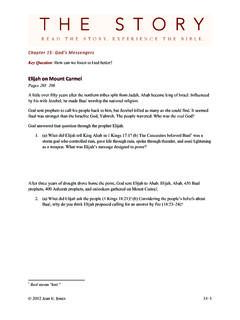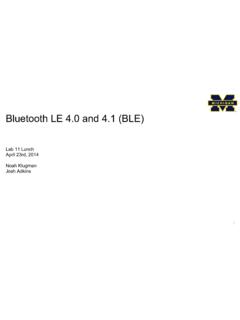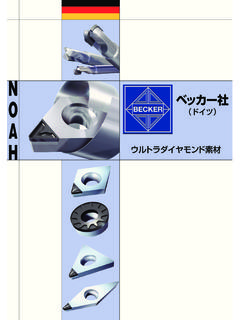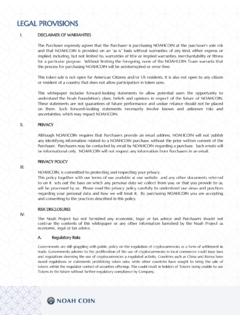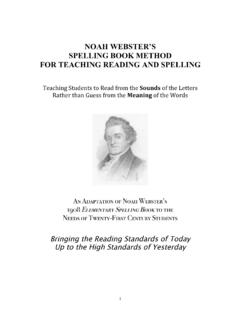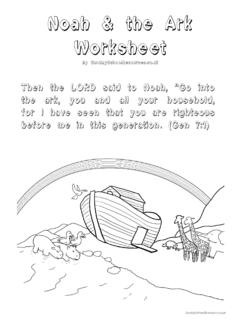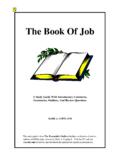Transcription of Chapter 1: Creation: The Beginning of Life as We …
1 2012 Jean E. Jones 1 1 chapter 1: Creation: The Beginning of life as We Know It Key Question: What was lost in the Garden of Eden, and why? Is there hope of getting it back? Creation Pages 1 4 In the Beginning . That s where our story begins: the Beginning genesis of creation. 1. (a) Who created the heavens and the earth (Genesis 1:1)? (b) What rights do creators have over their creations? 2. For what purpose were humans created (Genesis 1:26)? 3. What was the status of all creation when God finished creating (Genesis 1:31)? God made Adam14. (a) What command did God give (Genesis 2:16 17)? (b) What would happen if Adam disobeyed? (c) Why do you think God gave Adam free will? from the dust of the earth and placed him in the Garden of Eden.
2 There God formed woman from man. Initially Adam called her woman; later he would name her Eve. 1 Adam is Hebrew for man. 2012 Jean E. Jones 1 2 5. (a) What two things did Adam and Eve not have (Genesis 2:25)? (b) Why did they feel no shame? Adam and Eve Pages 4 5 Satan in the form of a serpent26. (a) How did the serpent s representation of God s command differ from God s actual command (compare Genesis 2:16 17 with Genesis 3:1)? (b) How does emphasizing what is denied rather than what is freely given affect contentment and gratefulness? (c) How can such an emphasis affect our relationship with God? (d) What can we do to combat this? spoke to Eve.
3 7. (a) In what way did the serpent say God had lied (Genesis 3:4)? (b) What did the serpent say was God s true motivation for denying the fruit (3:5)? (c) Why is it important to remember God s intentions for us are good when we re tempted to disobey his commands? Eve had a choice: she could believe God or she could believe the serpent. God had never given her reason to doubt his character or his word, but now the serpent told her God was keeping something good from her. The desire to be like God, to be his equal even, enticed her, and she chose to believe the serpent. 8. How was Eve s rebellion against God similar to teenage rebellion against parents? 2 Revelation 12:9.
4 2012 Jean E. Jones 1 3 She reached out her hand, took of the fruit, and gave some to her husband. Their eyes opened and those who had never known shame felt its deathly pall and knew Eve had chosen wrongly. They knew too that they were naked, for the ashamed dread nakedness. 9. (a) Adam and Eve tried to cover up their shame with fig What are ways we try to cover up shame? (b) When they heard God coming, they hid behind What are ways people hide from God when they feel ashamed? (c) When God asked Adam where he was, what did Adam reply (Genesis 3:10)? God had seen Adam naked before. Adam s great fear was that God would find out about the fruit, not his nakedness. God asked Adam if he had eaten the forbidden fruit.
5 God knew the answer, but gave Adam a chance to confess. 10. (a) What two beings did Adam blame for his transgression (Genesis 3:12)? (b) Whom did Eve blame (Genesis 3:13)? (c) Does blaming others remove guilt? Why or why not? (d) Eve s response was an appeal to pity: I m a victim, so it s not really my fault. What are other ways people appeal to pity to escape responsibility for wrongdoing? The Judgment Pages 5 7 God judged the three beings, but in the judgment gave hope to the man and woman. 11. (a) What would the serpent do to a descendant of Eve s (Genesis 3:15)? (b) What would Eve s descendant do to the serpent (3:15)? 3 Genesis 3:7. 4 Genesis 3:8.
6 2012 Jean E. Jones 1 4 God cursed the serpent, but not the man and Instead, God promised a Serpent Crusher would one day come. The serpent would bruise his heel, but Eve s offspring her seed 6 Within Eve s judgment of painful childbirth lived the hope of bearing children. Within Adam s judgment of painful toil remained the hope of producing life -sustaining food. Though they would die, the human race would continue. would deal him a mortal blow. God cursed the ground too: it would bear thorns and thistles and was bound to The earth would pass Are there any natural evils mold, cancer, tsunamis, etc. that could not have resulted from God cursing the ground? 9 Hearing God s judgment combined with hope, Adam with faith now named his wife Eve, because she would become the mother of all living.
7 1013. (a) What would humans now know (Genesis 3:22)? (b) Why did God banish them from the Garden of Eden (3:22 24)? (c) Why wouldn t God want creatures that had chosen to rebel to be able to live forever? (d) What hope did God give in letting us know a tree of life exists? In compassion, God clothed Adam and Eve, covering their shame and protecting them from the elements. 5 Not all divine penalties are curses. Adam and Eve did not lose God s entire blessing, and their penalty contained hope of future blessing. 6 The Hebrew word translated offspring means seed. In the Bible, offspring are often called seeds. 7 Genesis 3:17 19; Romans 8:21.
8 8 Luke 21:33; 1 John 2:17. 9 See also Isaiah 24:4 6. 10 Genesis 3:20. Eve sounds like the Hebrew word for living. 2012 Jean E. Jones 1 5 By taking of the fruit of the knowledge of good and evil, Adam plunged humankind into knowing evil, but also into knowing good. 14. (a) Give an example from history in which great good became known in the face of great evil. (b) Without naming names, give an example in which an experience with a person who lacked a virtue caused you to better understand the virtue and appreciate it in others. (c) How does knowing evil enhance our knowledge and appreciation of good? In the face of evil, such goods as self-sacrifice, courage, grace, and mercy are made evident.
9 None of these are humanly possible without the risk of personal loss or harm. The greater the loss or harm, the more heroic is the virtue that counters it. Eve s Offspring Pages 7 9 Eve bore children, and the earth bore food. Her first children, Cain and Abel, brought offerings to the Lord. The Lord accepted Abel s offering, but not Cain (a) How did Cain respond to God s disapproval (Genesis 4:5)? (b) How do God s three questions indicate Cain knew what was right to do and therefore had no valid reason for anger (4:6 7)? (c) What did God warn Cain he must do (4:7)? (d) List some temptations that accompany jealousy. (e) What are things we can do to help us master sin? 11 We re not told what was wrong with Cain s offering.
10 That Abel brought some of the firstborn while Cain brought some of the fruits not some of the firstfruits suggests Cain may have brought leftovers. The heart attitude counts most in offerings. Hebrews 11:4 tells us Abel gave his offering in faith, unlike Cain. (See Exodus 23:19a on the later firstfruits offerings.) 2012 Jean E. Jones 1 6 Cain didn t heed the Lord s warning. Instead, he gave in to sin and killed his brother. God cursed Cain and drove him from his presence,12 Time passed. Adam and Eve bore more children and eventually died. In those days, people lived nearly 1,000 years. As people increased, so did violence. and Adam and Eve knew evil. 16. (a) What did the Lord see when he looked into people s hearts (Genesis 6:5)?
